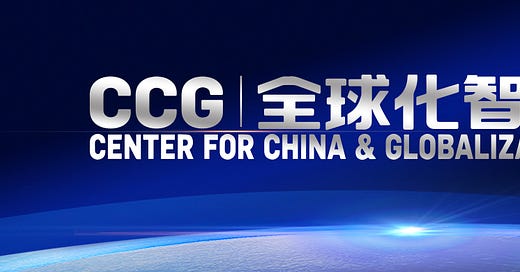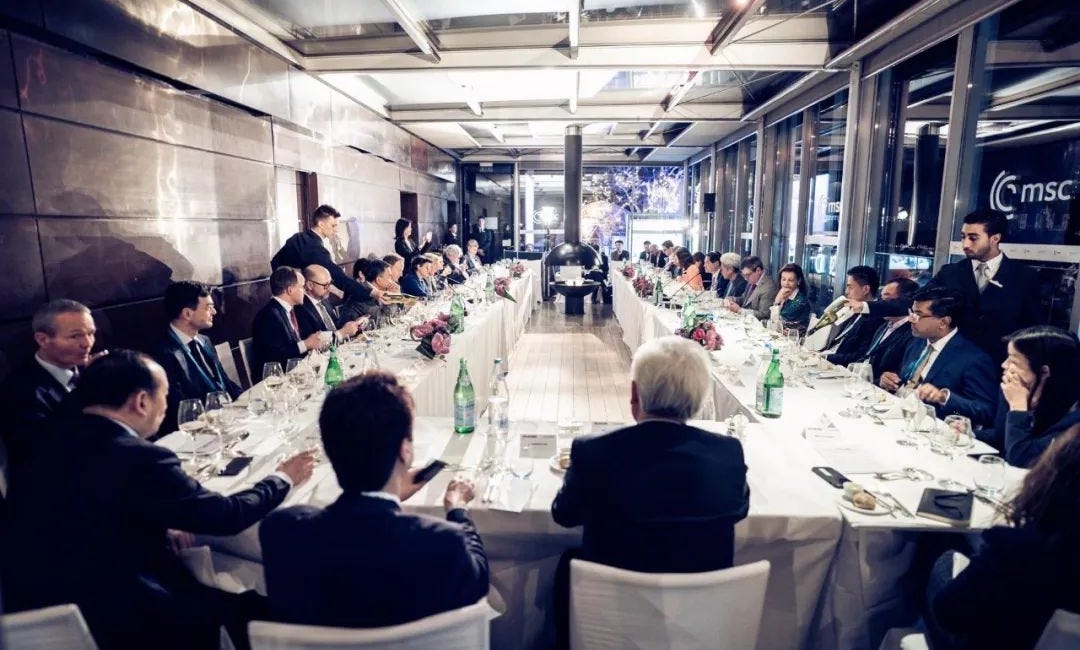The Munich Security Conference (MSC) 2024 will take place from February 16 to 18, 2024, at the Hotel Bayerischer Hof in Munich. The MSC 2024 will once again offer a unique opportunity for high-level debates on the world’s most pressing security challenges. Additionally, the MSC, founded in the fall of 1963, will celebrate its 60th anniversary up to and during the next main conference.
The Center for China and Globalization is happy to announce the following side event within the upcoming Munich Security Conference 2024. Please note that the side event is open to MSC participants only and participation is managed through the MSC system.
Among the major global problems confronting humanity today, climate change poses the most pervasive threat to communities and livelihoods around the world. China, the European Union, and the United States are the world’s three largest economies and geopolitical players, together they account for around 40 percent of global greenhouse gas emissions and consume nearly half the world’s energy. Beijing, Brussels, and Washington are locked in a dynamic, competitive, and complicated triangular relationship while cooperation will remain an enduring characteristic. No climate governance will materialize if the three can’t figure out some form of trilateral cooperation, however difficult. In the current tense geopolitical environment, how China, the EU, and the US as Climate G3 is possible to drive global cooperation together with the Global South? This event seeks to promote constructive dialogue in the spirit of the Paris Agreement.
Drawing on policy advisors and area specialists from China, the United States, and Europe, this event aims to examine the dynamics of the US-China-Europe bilateral and triangular relationship through both the lenses of climate diplomacy and broader geopolitical issues. The central questions it seeks to address include:
◆2024 is a momentous year of elections, how might shifting preferences of Washington, Brussels, and Beijing align for global climate governance? What are the biggest challenges ahead?
◆Looking at the domestic agendas of green transition for China, the EU, and the US, are there conceivable shared interests?
◆What are the conditions for the world’s three largest economies to embrace trilateral climate cooperation? What can be done to foster these conditions in the current tense geopolitical environment?
◆What are the security implications of the weak global governance on climate? Will a coalition of the world’s three largest powers be able to provide public goods such as a stable climate, hence, avoid the so-called Kindleberger trap?
Language:
English
Time:
15:30 – 17:00, Saturday Feb. 17
Confirmed participants so far (alphabetic):
1.Kavita AHLUWALIA, SVP Government Relations International, Uniper SE
2.Adis AHMETOVIC, Chairman of the Subcommittee on International Climate and Energy, SPD Parliamentary Group, German Bundestag
3.Graham T. ALLISON, Douglas Dillon Professor of Government, Harvard Kennedy School
4.Hildegard Bentele, Member of the European Parliament
5.Finbarr BERMINGHAM, Senior Correspondent, Europe, South China Morning Post
6.Jason BORDOFF, Founding Director of the Center on Global Energy Policy at Columbia University SIPA
7.Elizabeth C. ECONOMY, Senior Fellow, Hoover Institution, Stanford University; former Senior China Advisor at US Department of Commerce
8.Mariano-Florentino CUÉLLAR, President, Carnegie Endowment for International Peace
9.Helga FLORES TREJO, Head, International & Multilateral Affairs, Bayer AG
10.Barbara FRENKEL, Member of the Executive Board, Procurement of Porsche AG
11.Arancha GONZÁLEZ, Dean, Paris School of International Affairs, Sciences Po; former Minister for Foreign Affairs, European Union and Cooperation of the Kingdom of Spain
12.Jens HANEFELD, Head of International and European Policy, Volkswagen AG
13.Rachel JACOBSON, Assistant Secretary of the Army for Installations, Energy, and Environment, US Department of Defense
14.Feng JIANG, Professor for European Studies, Chairman of the Board of Shanghai Academy of Global Governance and Area Studies (SAGGAS) at Shanghai International Studies University (SISU)
15.Michael KEATING, Executive Director, European Institute of Peace
16.Heinrich KREFT, Professor and Chair for Diplomacy, Andrássy University Budapest
17.Daniel KURTZ-PHELAN, Editor of Foreign Affairs and Peter G. Peterson Chair at the Council on Foreign Relations
18.Kurt J. LAUK, Co-Founder and Chief Executive Officer, Globe Capital Partners
19.Zuokui LIU, Deputy Director, Department of European Studies, Chinese Academy of Social Sciences (CASS)
20.Michael MCFAUL, Professor of Political Science, Stanford University; Former U.S. Ambassador to Russia
21.Bernhard MEISING, Co-Chief Executive Officer and Partner, Kekst CNC
22.Mabel Lu MIAO, Secretary General, CCG; Munich Young Leader 2020; Member, The Chinese People's Political Consultative Conference (CPPCC) Beijing Committee
23.Jennifer MORGAN, State Secretary and Special Envoy for International Climate Action at the German Federal Foreign Office
24.Colum MURPHY, Bloomberg
25.Grégoire ROOS, Director of Program, BMW Foundation Herbert Quandt
26.Rainer RUDOLPH, Vice Chairman, Munich Security Conference
27.Daniela SCHWARZER, Member of the Executive Board, Bertelmann Stiftung
28.Erin SIKORSKY, Director, The Center for Climate and Security
Dan SMITH, Director, Stockholm International Peace Research Institute
29.Terazawa TATSUYA, Chairman and Chief Executive Officer, The Institute of Energy Economics
30.Justin VAÏSSE, Director General, Paris Peace Forum; former Director of the Policy Planning at the Ministry of Foreign and European Affairs of the French Republic
31.Yossi VARDI, Chairman, International Technologies
32.Henry Huiyao WANG, President, CCG; former Counsellor, China State Council; Vice Chairman of MOFCOM China Association for International Economic Cooperation (CAFIEC) and Director of Chinese People’s Institute of Foreign Affairs (CPIFA)
33.Yiwei WANG, Jean Monnet Chair Professor, School of International Studies, Renmin University of China
34.Meredith WHITTAKER, President, Signal Foundation
35.Ngaire WOODS, Dean of the Blavatnik School of Government, University of Oxford
36.Guntram WOLFF, Director and Chief Executive Officer, German Council on Foreign Relations
37.Shicun WU, President, National Institute for South China Sea Studies
38.Maha YAHYA, Director, Malcolm H. Kerr Carnegie Middle East Center
39.Patrick Peng ZHANG, Senior Fellow (non-resident), Center for China and Globalization (CCG)
40. Xiaozhuo ZHAO, Deputy Director, Secretariat, Beijing Shangshan Forum ; Senior Fellow, Institute of War Studies, Academy of Military Science, People’s Liberation Army, People’s Republic of China
Again, Please note that the side event is open to MSC participants only and participation is managed through the MSC system.
Additional information on MSC side events from the official website of the Munich Security Conference
What are MSC side events?
Each year, the MSC offers the unique opportunity for leading institutions to host an official side event within the framework of our flagship conference in February. Many renowned think tanks, government institutions, civil society organizations and partners from the private sector have made use of this platform, enjoying direct access to an exclusive community of decision-makers and key experts. From traditional defense and security policy, to questions of global order, technological change, sustainability and human security, the MSC is committed to tackling today’s most prominent security challenges. The MSC welcomes side events as enriching elements of the conference program and actively supports their organization and implementation through a dedicated team.





